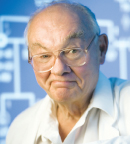Henry T. Lynch, MD, widely known as “the father of cancer genetics,” had an early life that could have been lifted from the pages of a Louis L’Amour novel. He dropped out of high school and using a falsified birth certificate joined the U.S. Navy at 16 years old, serving as a gunner on a marine ship in the Pacific during World War II.

Henry T. Lynch, MD
Following the war, Dr. Lynch had a stint as a pro boxer, a towering 6-foot 5-inch heavyweight, he fought in New York and the San Francisco Bay area under the ring name of “Hammerin’ Hank.” When he hung up the gloves, he decided it was time to settle down; he obtained his high-school equivalency diploma, the first small step in a long and storied career that left an indelible mark in cancer research and treatment. Dr. Lynch died on June 2, 2019. He was 91.
Fresh From the War
Dr. Lynch was born in Lawrence, Massachusetts, on January 4, 1928. He was reared in a poor neighborhood in metropolitan New York. After his rough-and-tumble times in the war and boxing ring, he acquired his high-school equivalency diploma and attended the University of Oklahoma as an undergraduate, where he began studying the three disciplines that would dominate his professional life for the following few decades: psychology, genetics, and medicine.
After obtaining his undergraduate degree, Dr. Lynch relocated to the University of Denver in 1952, obtaining his master’s degree in clinical psychology. In 1953, he began a PhD at the University of Texas, Austin, majoring in human genetics. After his dissertation, he went on to study medicine at the University of Texas in Galveston, obtaining his medical degree in 1960. In 1967, after various positions in other parts of the country, he joined the faculty of Creighton University School of Medicine, Omaha, where he remained throughout his career.
“When I began making the genetic connection to colon cancer, nobody believed me.”— Henry T. Lynch, MD
Tweet this quote
Pioneer Who Faced Skeptics
Dr. Lynch began studying the hereditary causes of colon cancer in the 1960s. “When I began making the genetic connection to colon cancer, nobody believed me. At that time, cancer was simply thought to be caused by exposure to chemicals. But I knew we had something here that could potentially save a significant amount of lives,” said Dr. Lynch during an interview.
Dr. Lynch’s vision of medical genetics was largely based on what he referred to as the “medical genetics research team.” His team consisted of a social worker, a few dedicated medical students, and various consultants from the clinical and basic science departments of the College of Medicine and the College of Dentistry. The team focused on the diverse hereditary diseases recorded in the state of Nebraska, determining their geographic concentration through epidemiologic maps.
Dr. Lynch was fond of telling a story from his initial days of genetic investigation. “I had a patient who was an alcoholic and was convinced he would die of colon cancer because so many people in his family did. He told me that fear of cancer was one of the reasons he drank so much,” said Dr. Lynch. Postulating there was indeed a genetic link, Dr. Lynch decided to investigate the heritability of his colon cancer risk. He labored through all the family trees of his patients, finally discovering that the risk for some colorectal cancers was heritable. However, due to several circumstances, Dr. Lynch’s theory of familial colon cancer connection would not gain widespread acceptance until the identification of the first cancer genes in the 1990s. After this, his collection of family histories would become vital to the molecular work on the genetics of cancer, most notably the eponymous Lynch syndrome, hereditary nonpolyposis colorectal cancer.
Dr. Lynch would go on to establish the cardinal principles of cancer genetics: early disease onset, specific patterns of multiple primary cancers, and Mendelian patterns of inheritance in extended families. He also discovered that some primary tumors of the breast and ovary follow a Mendelian pattern of inheritance. That seminal work contributed to the discovery of the risks associated with BRCA1/2 mutations.
Tough and Determined
Colleagues remember Dr. Lynch as a tireless researcher and patient advocate who counseled families with a high incidence of cancer, emphasizing that early detection of the disease could save their lives. Even into his 80s, Dr. Lynch took phone calls from patients around the world, often reporting to work at 3:30 AM, so he could have an extended day of research.
The former Jane Smith, who was Dr. Lynch’s wife of 60 years, died in 2012. Survivors of Dr. Lynch include 3 children—Patrick Lynch of Houston, Kathy Pinder of Corona, California, and Ann Kelly of Redondo Beach, California—2 brothers, 10 grandchildren, and 9 great-grandchildren. ■

